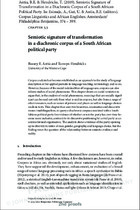Semiotic signature of transformation in a diachronic corpus of a South African political party
Abstract
Corpus analysis has become established as an approach to the study of language
description or for applied pursuits in language teaching, terminology, and so on.
However, because of the social indexicalities of language use, corpora can also
inform studies of social phenomena. This chapter draws on social semiotics to
argue that, in the analysis of social phenomena, meanings that are socially significant
can be read not only from what is said in corpora, but also from a range of
other resources, such as names of persons and places as well as language choices
made in texts. This chapter thus uses two heuristics, onomastics and discursive
mono-/multilingualism, to query a diachronic corpus associated with a South
African political party for evidence of whether or not the party has over time become
more inclusive, contrary to its discursive positioning by a rival party as an
untransformed organisation. The analysis shows evidence of the party opening
up to diversity in terms of race, gender, geography, and language choice, but the
finding raises the question of the relationship between semiotic evidence and
reality.

